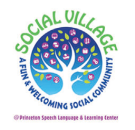BY LAUREN AGORATUS, M.A.
While Social Village is not intended as a replacement for therapy, it is giving children with learning disabilities, ADHD, autism and other challenges that impact a child’s social IQ a chance to feel welcomed and to feel happy.
Social Village is a novel concept in facilitating social interaction that is helping children develop friendships while having fun at Princeton Speech-Language & Learning Center in Princeton, N.J.
What is Social Village?
Social Village uses popular games and activities and the idea of “clubs” to bring together children ages eight to 23 on weekends. It is housed in a series of rooms built in the style of a teenager’s bedroom or clubhouse. Children are free to move from room to room during the same session to explore various activities. There is a Lego© Room, Videogame Room, Music Room, Quiet Room, and more. There are regular themes as well. (For example, one week might focus on “Minecraft”, during which the children create Minecraft mosaic pictures, make Minecraft mosaic rice treats, and so on.)
Opened in the fall of 2014, Social Village currently offers two weekly sessions:
• “Friday Night Out” for teens and young adults between the ages of 14 and 23 with activities including movies, live musical performances, board games, video games, and many others.
• “Sunday Clubs” for children ages eight and up, including clubs for Games, Pokemon, Minecraft©, Legos,© Fantasy Books, Art & Anime and card games.
There are also outdoor activities, weather permitting.
How Does it Work?
According to Executive Director Terri Rossman, M.S., CCC-SLP, the vision for Social Village is “to provide a place for kids with mild social challenges to feel comfortable and have fun. It’s a place where they can find like-minded peers, pursue their interests and feel connected to a social community.” Trained social coaches monitor interactions among participants so that behavior is appropriate. Coaches reinforce skills using concepts including:
• Social Thinking®, which helps children understand “the thought behind the social skill,” based on the work of Michelle Garcia Winner, MA, CCC-SLP, a world renowned expert in the treatment of individuals with social-cognitive deficits. (Please see the other article in this issue for more details on Social Thinking.)
• Executive Function, which is introduced to children using concepts such as “Stop and Read the Room” for situational awareness; “Ready, Do, Done,” the 3 Steps to task execution; and understanding the “Passage of Time.” These concepts were developed by Sarah Ward, MS, CCC-SLP, and Kristen Jacobsen, MS, CCC-SLP of www.cognitiveconnectionstherapy.com
• Self-regulation, which is enhanced using concepts from “The Zones of Regulation©,” a curriculum developed by Leah Kuypers, M.A. Ed., OTR/L that uses vocabulary and concepts to help kids stay in the expected zone, or emotional state or arousal level. These visual cues are posted on the walls of the rooms as reminders to help stay self-regulated:
While Social Village is not intended as a replacement for therapy, it is giving children with learning disabilities, ADHD, autism and other challenges that impact a child’s social IQ a chance to feel welcomed and to feel happy – without the pressures of trying to “fit in” that they might encounter
at school.•


